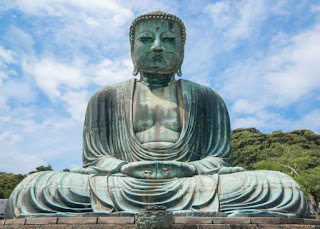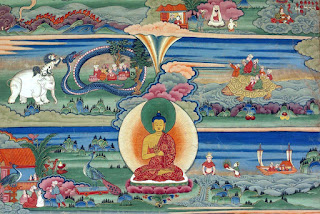Week 2 Story: "The Buddha: Teacher of Gods and Men"
The Buddha: Teacher of Gods and Men
As was customary for Siddhartha, he headed back to his sleeping quarters by dusk to rest from a
long and tedious day of leading and mingling with his multitude of disciples. He would rest for only a
couple hours. Then, when all of his disciples were asleep, and surely nobody would disturb him, the
gods would descend and manifest in young Siddhartha's quarters.
The gods would come to this youthful and humble man to be his Heavenly disciples just like those
who were sleeping were Siddhartha's Earthly disciples. You see, the Buddha was a teacher of both
gods and men. Different divinities came and went on different nights. Sometimes the whole pantheon
squeezed in with Siddhartha, while other nights, one lonesome deity would come for his/her
own individual purpose. Tonight, it was Sakra, ruler of the gods, who welcomed himself into
Siddhartha's abode. He came with another divinity that Siddhartha was unfamiliar with. This
particular being had a much less luminous glow than the other deities.
Sakra: (Bows deep with hands folded) I am pleased to be in your presence once more my beloved
Buddha. Much thanks for leaving your domain open to my convenience.
Siddhartha: The pleasure is mine, Sakra. I have nothing to fear so much as to not welcome it into my
home. (The Buddha goes silent and makes eye contact with Sakra's divine companion).
*If there was ever a person to make even gods forget their manners, it was young Siddhartha.
Sakra: Ahem (clears throat) pardon me my Lord. This is a new student of mine, Yashun.
Yashun: (Steps in front of Sakra and bows deeply with hands folded) Pleased to be in your presence,
young Buddha. I have heard much of your likeness from my dear Master. (gestures back at Sakra)
Siddhartha: The pleasure is mine, Yashun. You are in good hands with Sakra. He knows well the
ways of the Dharma.
Sakra: That is precisely the reason we came to you tonight, my dear Mentor. I am having trouble
existing in harmony with the Dharma and, resultantly, Yashun's progress has halted.
Siddhartha: (Chuckles lightly) You think too strictly, my dear Sakra. Even for a god. Your troubles
come from your own rendering of what this Dharma is. You see, Dharma is not something that has
to be done. It simply is. With or without you. When you truly understand this, you know that there
are no strict standards required for you to harmonize with your piece of the Dharma. No matter
what you decide to do, it is only done because the action already is in accordance with your
Dharma nature.
Sakra: With all due respect, my Teacher. It can't possibly be that simple, can it? What is there to strive
for if I am already harmonized with my own Dharma?
Siddhartha: My dear Sakra. Your striving for something greater is not done in the name of reaching
your Dharma nature. It is done because of your Dharma nature.
Sakra: So you're saying that I strive for this harmony, that I have falsely labeled Dharma, not out of
necessity but out of contingency?
Siddhartha: You are correct, my divine student. For if it was necessary that you accomplish your aim,
it would have already been done. This is because necessary things must exist if they are to truly be
considered necessary. Your aim has not been accomplished. So obviously, it is not necessary.
Therefore, it is not Dharma because Dharma is necessary.
Sakra: (Shakes head in shame) Then perhaps I have come here and asked a silly question, my Lord.
Perhaps, I shouldn't have asked how to become harmonized with my Dharma. Rather, a better
question is what am I to do with my Dharma?
Siddhartha: With all due respect, my dear student (*notice how Siddhartha shares a mutual respect
with his disciples) that question is, in essence, no different then your first inquiry. Notice that both
of your questions rely on this feeling that there is some goal that you must strive for and attain. I
tell you truly, if something is necessary, it is already done. Everything else is simply born out of
desire.
Yashun: If I may inquire, my Buddha. Are we to shun desire? What are we to live for if we have
nothing to strive for? And what are we to strive for if we cannot desire anything?
Siddhartha: That is quite a noble question, Yashun. Allow me to answer. The only thing you are to
desire, is the end of desire. Thus, the only thing to strive for, is the end of striving. Once you blow
out the flame of your desire, there is no more fire to be fed. Hence, there is no more craving nor is
there a need to be sustained by anything.
Sakra: Yes, that was a very noble question, Yashun. I am proud to have such a great enquirer and
ambitious learner as my student. My Buddha, I fear what you said about dowsing the flames of our
desires. My beloved apprentice, Yashun, brought up an idea of momentous importance. That is, if
we stop striving, we have nothing to live for. Hence, we will have nothing. Not even ourselves. If
we are to stop striving for anything, even our very existence, then that is to suggest that we are of
no importance. Nor is anything in existence.
Siddhartha: My dear Sakra, there is a difference between importance and significance. We do not
exist to strive for importance, but rather, significance. Allow me to make this clearer through the
use of analogy. An adult is more significant than a child, yes? An adult is larger, stronger, sharper,
wiser, and more experienced than a child. Yet, if there were only enough food in a village to feed
the children, but not the adults, who do you say gets the food? Do the adults get the food because
they are more significant? No, my dear Sakra. You see, significance has an inverted relationship
with importance. The adults may be more significant then the children, but that makes the former
less important than the latter. The children are important because they are more feeble. They
require more nurture and care than the adults. So, the food should go to the children of the village.
Even if the adults starved, they would've already experienced a more significant life than the
children. If the adults lived, then they would be more able to nurture themselves back to full health
than the children would have been, had they survived the ordeal. Think of your godhood as a real
life manifestation of this analogy. Being a god makes you more significant than mortals. However,
you should realize that makes you less important than them. They do not worship you because you
use your power take from them, but because you use it to give to them. The strong, the wise,
and the able are of more significance but less importance than the weak, the foolish, and the
unable. Their flames of desire are more dowsed than those of the weak, the foolish, and the
unable. Hence, they need less sustenance. Therefore, it is of no importance for the strong, the
wise, and the able to help themselves. Their passion, which is in accordance with their Dharma, is
to help those who are more important. The weak, the foolish, and the unable. And they help them
so that, in turn, the weak, foolish, and unable may become the strong, wise, and able who will go
on to help the new strong, the new foolish, and the new unable. Thus is the turning of the Wheel
of Dharma.
Yashun: (Smiles) We see clearly now my Lord. Your ways of explanation are indeed profound
beyond comparison. I am overjoyed to have come here. (Gets up and bows very deeply)
Sakra: I second my disciple. My Buddha, your wisdom is beyond compare. There is no value I can
place on it. I can only hope that my gratitude comes across to you as grand as it is in me. (Gets up
beside Yashun and bows just as deeply).
Siddhartha: Your learning is enough payment for my teaching. Thank you. (Bows with eyes closed
while sitting)
With that, Sakra and Yashun ascended up through the roof and vaporized into some far off reaches
of the Heavens. After they were gone, Siddhartha sat peacefully and meditated for a few minutes.
Then, he lay on his side and fell asleep. His meditative state was sustained, even while he was in the
most blissful deep sleep.
*Author's Note: I got the idea for this story from the Unruly Monks included in the Jatakas Anthology. My story was not at all based on that story. However, the spark for my idea came from the Buddha and the way in which he mentored people, animals, and gods. Yashun is not an actual deity nor did any gods in Buddhism have disciples. Yashun is an entirely made-up character. Also, some of these teachings that I emulated as coming from the Buddha are not actual words that the Buddha spoke. They are my own words that I have articulated to emulate what I thought would be a realistic version of the Buddha's wisdom based on his teachings of simplicity and living in the present without focus on desire. Sakra is a real god featured in Buddhist Jatakas stories and the Buddha was said to have actually taught the gods in his abode at night. Dharma is also a real Buddhist concept. The nature of how it is described in the story is my interpretation.
Bibliography. "Unruly Monks" from the Jataka: Volume 1 translated by Robert Chalmers. Web Source




Hi Ethan,
ReplyDeleteI greatly enjoyed reading your story. It is clear that you have a gifted skill of creativity. I really enjoyed how you used your own thoughts for depicting what you thought Buddha’s wisdom would focus on. Also, very fascinating that your carefully crafted the character Yashun. You did an excellent job on this story and I look forward to reading more as the semester progresses.
-Andy McDowell
Hi Ethan. I enjoyed reading your story, although at times I found it a little difficult to follow. It could be because the dialogue is so steep and rich in philosophical debate and that sort of stuff occasionally flies over my head. A suggestion, if you would like, would be to add filler text that explains the dialogue if lots of readers are having trouble. It might have just been me, so if no one else brings it up, I'd say you're doing great! And even if they do bring it up, I really enjoyed the story so you're doing great anyway! I love how you have characterized Buddha as such a giving teacher. It is also cool to see your story reflect your major in philosophy by using the wisdom of Buddha. Great work!
ReplyDeleteHi Ethan, I really enjoyed your story. I wasn't expecting a completely different story from the ones we read, which was refreshing. Your use of dialogue and almost a play-writing style was actually a very useful way to describe the scene. Also, why did Sakra first come to learn from the Buddha? What was their first encounter like? Was the Buddha surprised to find gods asking for help? Some more information about both of the gods that visited Buddha would be useful for the reader. Maybe you could also explain why Sakra brought another god with him. Answering all these questions would provide more context for the scene your created and make the very abstract discussion more grounded. Your explanations were very good but could be further supported by context. I liked the language you had the gods use throughout the story and the Buddha. You did a good job of emulating the kind of elegant speech one would expect from these characters. Great story!
ReplyDeleteHello! I enjoyed reading this story. I like that you included dialogue because that always helps make the story personable and understandable. Creating your own character "Yashun" is great and was incorporated well! Do you find inspiration for stories through philosophical ideas? I have always enjoyed researching buddhism so when I saw that this story was about Buddha, I was drawn to it.
ReplyDeleteEthan, your story was so well versed. At first, I was looking at your story and I thought I may get lost within it, but you wrote so coherently. The message behind everything you wrote was beautiful. I have never read any of Buddha's teachings or heard any of his messages, so it was really cool to read this. I have always been a fan of dialogue in stories because I think it allows you to really connect with the characters. The fact that you told your story though dialogue was really awesome!! I feel like sometimes when authors try to do that, the story gets lost. But, you did great! I was wondering how you planned this story out? You said that you wrote out Buddha''s teachings in a more simple way and I'm impressed on well you did it.
ReplyDeleteHey Ethan! First off, I am very impressed with how you took just a tiny spark from the readings and created something entirely yours. You obviously have a lot of creative ability and it truly shines in this piece. I'm curious as to how you decided to write in this style. Glancing at it, it reminds me of a script for a play, especially with the style you chose to do dialogue in. I think it is very unique, but it really works for the content of the story. Over all, I think it is brilliant, but what if you included either some more images or spacing to break up the text a bit more? Currently, it looks a bit daunting with just a very long stream of text with nothing to break it up visually. I understand if it’s the style you are going for, but sometimes having continuous text on a blog like this can be even more distracting than having an overwhelming amount of images.
ReplyDeleteEthan, you are such a skilled writer! I love how you added a character to the story to make the teachings of the character's more clearly stated to the readers while still sticking to the central lessons of Buddha. This story inspired me to use more dialogue in my story so that my readers can get to know my characters on a more personal level and so they can see how my characters interact with each other. If we get the chance to choose any readings that we want to write stories about later in this class, I think I might use your story as inspiration to have Buddha gives teachings to other religious figures like Jesus (I'll come back and comment a link if I do!!).
ReplyDeleteHi Ethan, this was a very deep story! The long monologues filled with different philosophical takes on subjects with the logical nature of the dialogue made it both hard to follow sometimes, but also enriching at the same time! There was a little difficulty when switching between characters and following who said what, but overall, I think it was an excellent story. I hope you have a great semester!
ReplyDeleteHey Ethan,
ReplyDeletethis was a very good story and really enjoyed getting to read it. It was very deep which made it even more interesting to read. It was really clever and creative that you added an extra character to the story to make the point of it ever clearer, it takes a lot of skill to be able to do that.